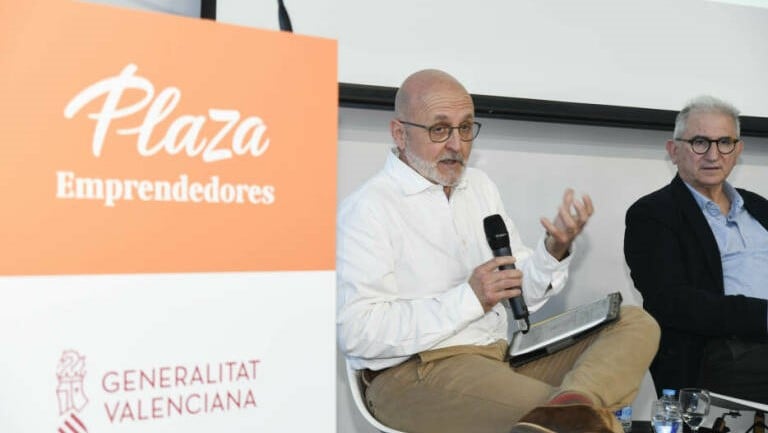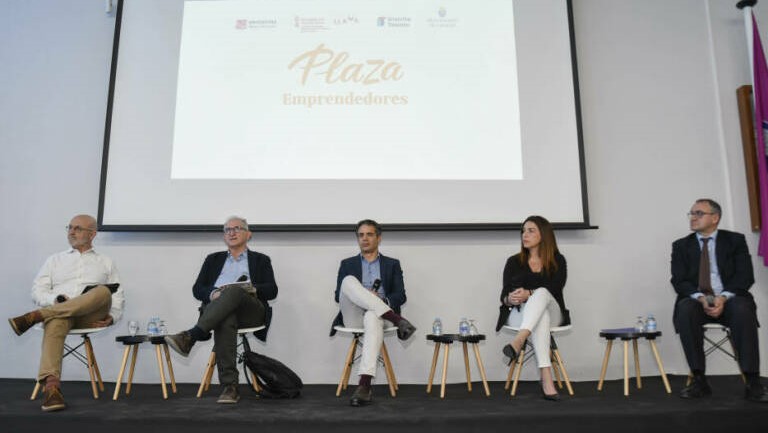The director of the Parc Científic de la Universitat de València (PCUV), Pedro Carrasco, participated last week in the round table 'Entrepreneurship in science parks of the VC', framed within the third gala of Plaza Emprendedores, where representatives of the five science and technology parks of the Valencian public universities addressed issues such as the present and future challenges of these entities, the new Startups Act, talent management, the role of women entrepreneurs or the link to the territory
Together with the director of the PCUV, Juan Antonio Bertolín, manager of the General Foundation of the Universitat Jaume I and director of Espaitec; Javier Sancho, director of the Entrepreneurship Area of the Science Park of the Miguel Hernández University of Elche; Esteban Pelayo, manager of the Alicante Science Park, and Esther Gómez Martín, vice-rector of Students and Entrepreneurship of the Universitat Politècnica de València, participated in the round table.
In the first point, the participants analyzed the challenges shared by the science parks, focusing their attention on startups. Here, Carrasco pointed out that "many times, these companies accumulate knowledge but do not know the market, what a business plan is, and we have to accompany their ideas to make them viable." For his part, Gómez noted that all the startups "want more clients and investment" and highlighted the support of the parks in the preparation of proposals, an aspect "that is usually complicated" for these companies.
In this sense, Bertolín regretted that the Administration "requires a flexibility that it does not have to the maximum" and referred to the lack of talent as the main challenge at present, "because there is none, before it comes out it has disappeared, and the truth is that universities do not generate enough, plus today the remote work models make it more difficult for local startups, because you can charge from Castelló a salary typical of Silicon Valley or Madrid."

(L to R) Juan Antonio Bertolín, manager of the Fundació General de la Universitat Jaume I and director of Espaitec and Pedro Carrasco, director of theParc Científic de la Universitat de València. Photo: BORJA ABARGUES
"Many times, these companies accumulate knowledge but do not know the market, what a business plan is, and we have to accompany their ideas to make them viable," Pedro Carrasco, director of the PCUV
New challenges
Another of the points that marked the round table was the Startup Law, and for Sancho this law "has lacked more flexibility in the working environment of startups, which require it in areas such as hiring and taxation." Along these lines, the director of the Park reproached the Administration for "not usually shining for its agility and in innovation, either there is speed or we cannot function, agile instruments are needed." Pelayo emphasized that it still has no impact "but we see it as interesting, because at least the startup concept is formalized."
In the field of gender equality, Pedro Carrasco put the percentage of women in companies installed in the park he directs at 48%, "although in management positions it drops to 18%," although in some grades there is a higher proportion of women in charge of initiatives than in others. In his case, Javier Sancho (UMH) pointed out that the analysis of 400 projects selected in the last five years shows "an important qualitative leap, with 31% of co-founders, a percentage that increases to 52% in the data of companies in which the park participates, with a proportion of over 40% in leadership positions."
Juan Antonio Bertolín pointed out that in Espaitec (UJI) only 100 out of 400 workers are women, "although we are seeing in the UJI Emprèn On Social program a certain improvement." Gómez recalled at this point that "if a girl before the age of 11 has not shown interest in STEAM careers it is difficult for her to do so, so a lot of work is needed in this aspect." For his part, Esteban Pelayo (UA) made a pessimistic diagnosis, and that is that "we are not doing well in equality, at 20%, we have 3 out of 15 companies created by women, and we are not as successful as we should be, especially in technology, with better data in the technical staff of startups dedicated to the pharmaceutical or biological fields."
"If a girl before the age of 11 has not shown interest in STEAM careers it is difficult for her to do so, so a lot of work is needed in this aspect," Esther Gómez Martín, vice rector of Students and Entrepreneurship at the Universitat Politècnica de València
The future of the PCUV
Finally, the linkage of the territory and the short and medium term plans of the parks were the closing of the round table. On these points, Carrasco bet on involving the territory in the project, "so that the knowledge reaches where we have headquarters." Likewise, the director of the PCUV emphasized that his first six months at the head of the UV park have been focused on "students, professors and the challenges of the companies" and pointed out that companies "do not understand us, so we must know their challenges themselves, we lack a continuous chain between all the actors," in addition to betting on internationalization. In this respect, he referred to a pilot plant project for biogas generation in Aras de los Olmos, together with the universities of Dresden and Ghent, as an "almost perfect model."


